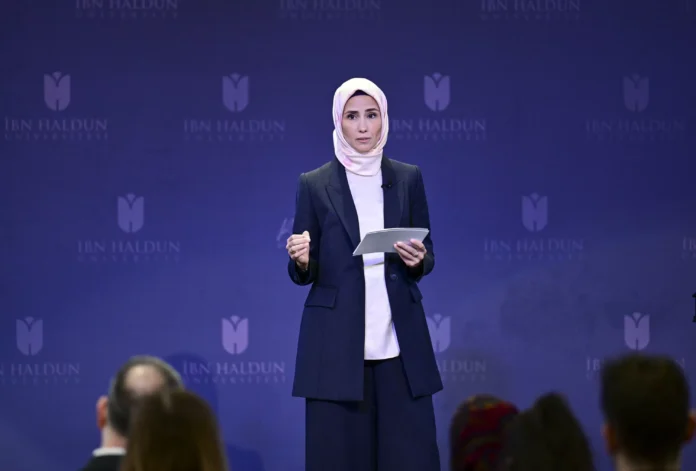Sümeyye Erdoğan Bayraktar, the Chairwoman of the Board of Trustees of the Women and Democracy Foundation (KADEM), delivered a powerful and thought-provoking speech at the 4th International Women and Justice Summit in Istanbul, Turkey. Her speech shed light on the prevalent issue of systemic discrimination against women in various aspects of society and called for collective action to overcome these challenges.
Bayraktar began her address by acknowledging the advancements made towards women’s empowerment and gender equality in recent years. However, she stressed that there is still a long way to go as women all over the world continue to face discrimination and marginalization in all spheres of life. She highlighted that around the world, women are underrepresented in leadership positions, earn less than men for the same work, and are often subjected to violence and abuse. Bayraktar emphasized that these are not isolated incidents, but rather a systematic issue that needs to be addressed urgently.
Drawing on her experience as the Chairwoman of KADEM, Bayraktar shed light on the efforts being made to empower women and promote their rights in Turkey. She highlighted that KADEM has been working tirelessly to promote gender equality and support women in various aspects of their lives, including economic, social, and political. The Foundation has been actively conducting research, organizing workshops, and providing training and support to women to help them reach their full potential and overcome the barriers that hold them back.
Bayraktar also spoke about the importance of education in promoting women’s rights and empowering them. She stressed that education is the key to breaking the cycle of discrimination and empowering women to be agents of change in their communities. KADEM has been working on educational programs targeted at women, particularly in underprivileged and rural areas, to provide them with knowledge and skills to become independent and active members of society.
The Chairwoman also talked about the need for a holistic approach to address the issue of discrimination against women. She emphasized that it is not just the responsibility of governments and NGOs, but also of the entire society to work towards creating a more equitable and just environment for women. Bayraktar called on both men and women to join forces and fight against the patriarchal mindset that perpetuates discrimination against women. She urged everyone to reflect on their actions and attitudes towards women and make a conscious effort to challenge and change them.
Furthermore, Bayraktar highlighted the role of digitalization in promoting women’s rights and overcoming systemic discrimination. The technological advancements have made it possible to empower women in different ways, such as providing access to education and job opportunities, connecting them to support networks, and raising awareness about their rights. She also stressed the need to ensure the safe and responsible use of technology and protect women from online abuse and harassment.
In her speech, Bayraktar also emphasized the importance of collaboration and cooperation between countries to address the issue of discrimination against women. She urged all nations to join hands and work together towards creating a world where women have equal opportunities and are valued as equal members of society. She called on governments to implement policies and laws that promote gender equality and protect women’s rights.
In conclusion, Sümeyye Erdoğan Bayraktar’s address at the 4th International Women and Justice Summit shed light on the prevalent issue of systemic discrimination against women and called for collective action to overcome it. Her speech was a powerful reminder that despite the progress made, there is still a long way to go in achieving gender equality and empowering women. It serves as a call to action for all individuals and organizations to work towards creating a more just and equitable world for women. As Bayraktar said, “Equality is not a privilege, but a right that must be ensured for every individual.”


